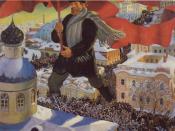A combination of tsarist incompetence and popular dissatisfaction led to the events of February 1917, but in October it was rather Bolshevik revolutionaries armed with radical ideas that seized power. Discuss.
The underlying reasons for the Russian Revolution were rooted deep in Russia's history. For centuries, autocratic and repressive tsarist regimes ruled the country and most of the population lived under severe economic and social conditions. During the 19th century and early 20th century various movements aimed at overthrowing the oppressive government. These were staged at different times by students, workers, peasants, and members of the nobility. Two of these unsuccessful movements were the 1825 revolt against Nicholas I and the revolution of 1905, both of which were attempts to establish a constitutional monarchy. Russia's badly organized and unsuccessful involvement in World War I added to popular discontent with the government's corruption and inefficiency. In 1917 these events resulted in the fall of the tsarist government and the establishment of the Bolshevik Party, a radical offshoot of the Russian Social Democratic Labour Party, as the ruling power.#
The revolution of February 1917 came about due to 2 main causes. The Tsar and how he ran the country and the public's dissatisfaction with their country and how it was being run.
The countries poor involvement in WWI also added to the rising discontent against Nicholas as the Russian armies suffered terrible casualties and defeats because of a lack of food and equipment. the country was also industrially backward compared to countries at the time such as Britain, France, Germany, and the USA. It had failed to modernise, this was to do with the Tsars lack of effort for reforms and an inability to make the country move forward economically. The country was undergoing tremendous hardships as industrial and agricultural output dropped.


